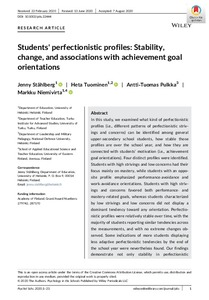Students' perfectionistic profiles: Stability, change, and associations with achievement goal orientations
Heta Tuominen; Markku Niemivirta; Jenny Ståhlberg; Antti‐Tuomas Pulkka
Students' perfectionistic profiles: Stability, change, and associations with achievement goal orientations
Heta Tuominen
Markku Niemivirta
Jenny Ståhlberg
Antti‐Tuomas Pulkka
Wiley Subscription Services, Inc.
Julkaisun pysyvä osoite on:
https://urn.fi/URN:NBN:fi-fe2021042823703
https://urn.fi/URN:NBN:fi-fe2021042823703
Tiivistelmä
In this study, we examined what kind of perfectionistic profiles (i.e., different patterns of perfectionistic strivings and concerns) can be identified among general upper-secondary school students, how stable those profiles are over the school year, and how they are connected with students' motivation (i.e., achievement goal orientations). Four distinct profiles were identified. Students with high strivings and low concerns had their focus mainly on mastery, while students with an opposite profile emphasized performance-avoidance and work-avoidance orientations. Students with high strivings and concerns favored both performance- and mastery-related goals, whereas students characterized by low strivings and low concerns did not display a dominant tendency toward any orientation. Perfectionistic profiles were relatively stable over time, with the majority of students reporting similar tendencies across the measurements, and with no extreme changes observed. Some indications of more students displaying less adaptive perfectionistic tendencies by the end of the school year were nevertheless found. Our findings demonstrate not only stability in perfectionistic tendencies, but also their motivational relevance in the academic context where students' goals and performance concerns play an important role.
Kokoelmat
- Rinnakkaistallenteet [19218]
